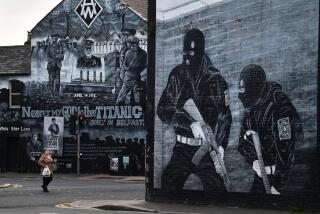Thatcher Seeks Ways to Combat IRA Bombings : Meets With Security Aides in Wake of Ulster Blast Killing 8 British Soldiers
- Share via
LONDON — In the wake of one of the worst attacks on British troops in two decades of violence in Northern Ireland, Prime Minister Margaret Thatcher on Saturday held urgent talks with her security chiefs to search for ways of combatting a fast-escalating Irish Republican Army bombing campaign.
The IRA claimed responsibility for the car bomb that killed eight British soldiers and wounded 28 others early Saturday near the town of Omagh in the western part of the province.
The soldiers were traveling in a civilian bus shortly after midnight on a straight, open stretch of road when the bomb blew the vehicle into a ditch, leaving a 6-foot crater in the roadway and parts of the bus and its human cargo strewn over a radius of more than 100 yards, according to witnesses.
Seven of the servicemen died almost instantly. The eighth died Saturday afternoon.
Czech Explosive
In its statement, the IRA said the bomb contained 200 pounds of the Czech explosive, Semtex.
“It was something I have never ever seen before and never ever want to see again,” said Alan Rainey, a nearby resident who helped with rescue efforts.
Members of two civilian bands were traveling in buses just behind the soldiers and also helped with the wounded.
Saturday’s bomb caused the third-largest loss of British army lives in a single episode in Northern Ireland since British troops were first deployed there 19 years ago to help restore order between the majority Protestant population and a Roman Catholic minority.
The IRA, whose support stems almost exclusively from Catholics, has launched sporadic campaigns over the last 70 years to wrest the province, also known as Ulster, from British control and create a united, socialist Ireland.
The organization is outlawed in the Irish Republic as well as in Britain.
Saturday’s bombing also marked the latest in a series of successful attacks against British troops mounted by the IRA in Western Europe, England and Northern Ireland that has left 26 soldiers dead so far this year--a death toll of British soldiers larger than the last five years combined.
The death of a British army lance corporal in the bombing of a North London army depot earlier this month marked the first successful attack by the IRA on the British mainland in nearly four years.
After Saturday’s bombing, Thatcher broke off her annual vacation in Cornwall to return to London for an emergency review of security measures with Lt. Gen. John Waters, commander of the 10,000 British soldiers stationed in Northern Ireland; provincial Police Chief John Herman, and her secretary of state for Northern Ireland, Tom King.
The circumstances of the latest bombing raised serious doubts about the security for British forces stationed there.
Needed Advance Information
With the soldiers traveling in civilian clothes and their bus one of three civilian vehicles moving together at fairly high speed in full darkness along the route, the IRA required detailed advance information in order to carry out the attack.
After a series of botched operations that required embarrassing apologies for killing the wrong people, the events of recent weeks culminating in Saturday’s attack are likely to provide a major boost of morale for the IRA.
“The families of the dead and injured British soldiers are paying the price of British interference in Irish affairs that Irish families have paid for decades,” said Gerry Adams, president of the IRA’s legal political wing, Sinn Fein.
According to sources with knowledge of IRA activities, the outlawed organization is believed to have large amounts of the Semtex explosive, apparently supplied by way of Libya.
Two tons of Semtex were seized last October from a Danish trawler off the French coast along with an array of other weaponry that Western intelligence sources claim was supplied by Libya.
The recent increase in IRA activity against British targets has revived calls to reimpose the policy of rounding up and interning suspected terrorists, a policy that proved to be a political and military fiasco when last tried between 1971 and 1975.
Return Demanded
The Protestant member of Parliament for the Ulster area where Saturday’s bomb went off, Ken Maginnis, along with two witnesses to the carnage, met with Thatcher here to demand a return to internment.
“The police know who detonated that bomb, and they have been allowed the freedom to do it,” Maginnis said after his meeting with Thatcher.
He said that Thatcher asked “quite penetrating questions” during their meeting but has given no indication that she is ready to take any action on internment.
Earlier this month in Australia, she described any return to internment as “a very serious step to take and we should think long before doing so.”
At a news conference Saturday, King said only that internment, like other security measures, is under constant review.
“We will look at any measure that will help eradicate this evil,” he said.
Leaders of Britain’s other main political parties condemned the bombings but also rejected internment as a failed policy.
Advocates of internment claim that the 1970s roundup was based on poor intelligence, which created a political backlash while leaving important IRA activists free.
More than a decade later, these advocates say, more refined intelligence information would enable a smaller-scale, yet more effective, internment policy.
Opponents, however, noted that security forces expressed similar confidence about the accuracy of its intelligence in the early 1970s and said they would probably do little better now.
More to Read
Sign up for Essential California
The most important California stories and recommendations in your inbox every morning.
You may occasionally receive promotional content from the Los Angeles Times.













